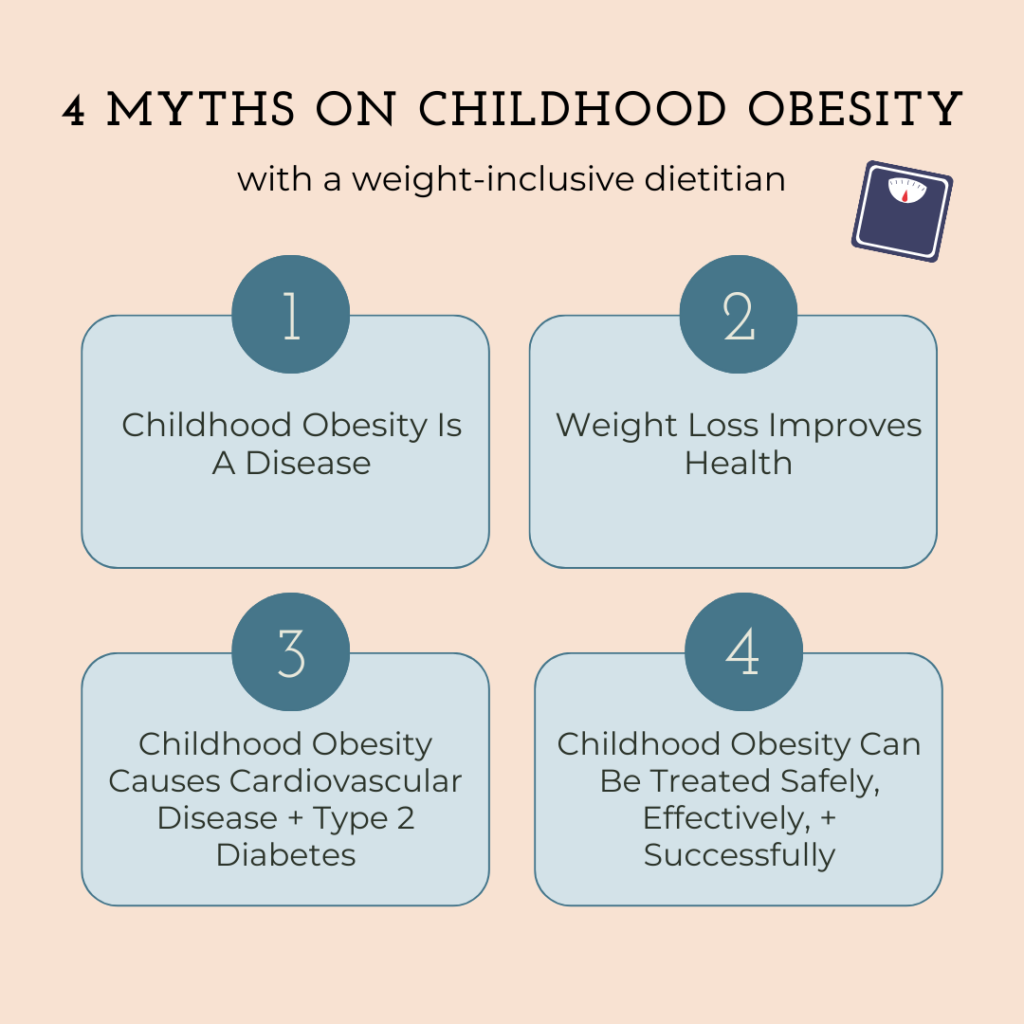The Effects of Childhood Obesity: 4 Myths
March 7, 2023
Outside of this blog post, I am not supportive of the term ‘obesity’. Read on to learn why.
Many sources weigh in on their opinion of the effects of childhood obesity. But what are the facts, and what are just myths?
If you haven’t heard the news, The American Academy of Pediatrics announced a comprehensive guideline on evaluating and treating children and adolescents with obesity.
As a weight-neutral and inclusive dietitian, I want to bring you my take on what these guidelines have to say.
In today’s article, I will be going over these guidelines, as well as four myths that circulate in the media around the effects of childhood obesity. Keep reading to learn more!
Are you looking for a Calabasas, CA, registered dietitian? Head to my services page to learn more about my current offers.
What Do The Guidelines Say?
‘There is more evidence than ever that obesity treatment in children is safe and effective.’ – American Academy of Pediatrics
This is appalling.
As I mentioned, The American Academy of Pediatrics released guidelines for treating children and adolescents with obesity.
The guidelines include:
- Higher weight kids, ages 2 and up, be referred for weight management (“intensive health behavior and lifestyle treatment”)
- Kids over 12 can be offered weight loss medications (i.e., injectables like Ozempic, and Wegovy)
- Kids over 13 can be referred for bariatric surgery
Isn’t Childhood Obesity a Problem?
It seems like common knowledge that fat is bad and is to blame for every health concern known to mankind. But so much of that narrative is exaggerated and inaccurate.
Here are 4 myths to consider when it comes to childhood obesity.
4 Myths About The Effects of Childhood Obesity
Myth #1 Childhood Obesity Is A Disease
The term ‘obesity’ comes from the BMI scale. A Belgian astronomer and statistician developed the BMI in 1832. It was never intended as a measurement of health. It is based on the height and weight of primarily white, middle- to upper-class European males.
Therefore, it doesn’t account for ethnic diversities in body composition. Doctors today use this scale to measure a person’s health, even though it doesn’t factor in age, sex, body size, fat distribution, or behaviors and lifestyle.
The ‘obesity epidemic’ that we’re sold to believe in is for insurance, pharmaceutical, and weight loss industries to profit off of.
Myth # 2 Weight Loss Improves Health
Diet and exercise account for just 15% of a person’s health outcomes. Other contributing factors include stress management, living in a marginalized body, and access to quality medical care and education.
Referring to obesity as a disease upholds body hierarchy, pathologizes people who don’t match societal ideals, and leads to weight stigma.
Weight stigma has harmful physical, psychological, and social effects on people in larger bodies, including contributing to disordered eating and eating disorders. Intentional weight loss is a stress-inducing process.
Considering stress plays as big, if not more, of a role in our health than body size, prescribing weight loss is not the health-promoting people think it is.
Myth #3 Childhood Obesity Causes Cardiovascular Disease and Type 2 Diabetes
Correlation does not equal causation. These associations are correlations at best.
Cardiovascular disease and type 2 diabetes are predominantly genetic conditions that affect people of all sizes. In fact, obese people with cardiovascular disease and type 2 diabetes have greater longevity than their thinner counterparts.
What’s more often the cause of these conditions is repeated weight loss and regain. Independent of body weight, a single round of weight fluctuation may damage blood vessels and raise the risk of cardiovascular disease.
As for diabetes, studies have shown that any initial improvements attributed to weight loss deteriorate after 6-18 months.
Whether weight loss occurs or not, type 2 diabetes can be improved or reversed with changes to nutrition and/or activity habits.
Myth #4 Childhood Obesity Can Be Treated Safely, Effectively, and Successfully
Bodies have a unique ‘set point’ weight that they function their best at. Fighting the body’s biology backfires 100% of the time.
Research shows that 95% of weight lost is regained within 2-5 years. Children who are put on weight loss drugs or undergo weight loss surgery are at particular physical and emotional risks since they are still growing.
Not to mention, metabolic and bariatric surgeries are the far from ‘safe and effective’.
- Acid reflux
- Anesthesia-related risks
- Chronic nausea and vomiting
- Dilation of esophagus
- Inability to eat certain foods
- Infection
- Obstruction of stomach
- Weight gain or failure to lose weight
- Dumping syndrome, a condition that can lead to symptoms like nausea and dizziness
- Low blood sugar
- Malnutrition
- Vomiting
- Ulcers
- Bowel obstruction
- Hernias

The Effects of Childhood Obesity: What’s the Answer?
Freedom from prejudice, access to quality nutrition, and environmental safety are privileges unfortunately not accessible to all.
Public health should instead focus on changing the structural systems that influence obesity like racism, socioeconomic, and environmental factors.
Our individual responsibility is to educate ourselves on the dangers of fatphobia.
If you’re ready to adopt a weight-neutral mindset, consider scheduling a discovery call. I am a weight-inclusive and a Health At Every Size® dietitian.
In my practice, I teach Intuitive Eating principles and how you can apply them to your life. Together, we’ll deprogram your diet mentality so you can show respect to your body and others.
Leave a Reply Cancel reply
home
about
services
Resources
contact
Rhonda@Rhondakrick.com
(310) 721-2260
//
//
//
//
Forget diets. Find freedom with food, peace with your body, and joy in your life.
//
design by morgan sinclair designs
//
privacy policy
calabasas, CA + virtual
Stay connected!
Signup for the Rhonda Krick Nutrition newsletter to stay connected and informed about all things Antidiet and Intuitive Eating!
Thank you!
You have successfully joined our subscriber list.